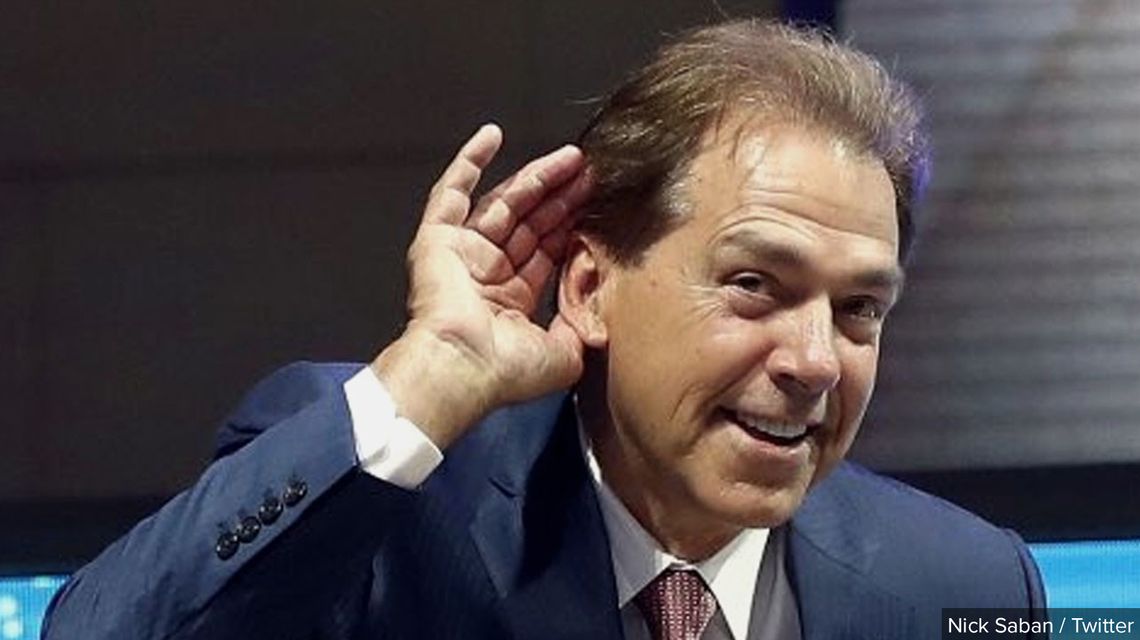
What if Nick Saban had never left college football?
BATON ROUGE, La. (BVM) — It has been almost 15 years since Nick Saban left LSU to take over head coaching duties for the Miami Dolphins. After just two seasons, he returned to college football. But what if he stayed at LSU?
During the 1990 college football season, Saban’s success started to come to fruition. At the University of Toledo, he led the Rockets to a 9-2 record. Toledo was named co-champion of the Mid-American Conference that year.
The following season, Saban would try his hand in the NFL. For four years, he served as the Cleveland Browns defensive coordinator for then-head coach Bill Belichick. Years later, Saban would refer to his time in the NFL as the worst years of his life.
In 1995, Saban returned to the college scene as Michigan State’s head coach. There, Saban impressed many with an upset of No. 1 ranked Ohio State at “The Horseshoe” during the 1998 season. In 1999 after beating powerhouses Notre Dame, Michigan, Ohio State, and Penn State in the regular season, Saban resigned as the MSU head coach and accepted the head coaching position at LSU.
Leaving MSU and taking the Tigers head coaching job in 2000 meant Saban would become the 31st head coach in the program’s history. With high expectations, an 8-4 record, and a Peach Bowl victory, Saban and the Tigers were off to a slow start. The 2001 campaign proved to be a successful one as the Tigers captured their first outright SEC Championship since 1986 and their first Sugar Bowl victory since 1968.
Two years later, Saban led LSU to the top, beating No. 1 Oklahoma in the BCS National Championship. With a 13-1 record, Saban had finally reached the top of the college football world.
With an overall record of 48-16 at LSU, Saban decided to take his talents to the professional level again. Late in 2004, Saban became the sixth head coach of the Miami Dolphins. They narrowly missed the playoffs after winning their last six games and finished the 2005 season with a 9-7 record.
The following year, the Dolphins were expected to contend for a playoff spot. The squad was considering picking up Drew Brees who had been released by the San Diego Chargers that year due to what was believed to be a career-threatening shoulder injury. The Dolphins signed Dante Culpepper instead. As the team progressed through the season, it was evident that it would not be a successful one.
Along with the disarray at the professional level, Saban was rumored to be taking the Alabama Crimson Tide head coaching position, which he denied at the time in an interview with ESPN by saying, “I’m not going to be the Alabama coach.”
After the Indianapolis Colts ended Miami’s season, Saban met with Alabama officials to discuss the open position. In ealy 2007, Saban accepted the job and was introduced as the 27th head coach of the Crimson Tide. Saban would also become one of the highest-paid coaches in college football signing a nine-year, $42.35 million deal.
Since taking over Alabama, Saban has won seven SEC West titles, six SEC championships, and five national championships. He is arguably the best coach the sport has ever seen. That begs the question: what if Nick Saban stayed at LSU?
If Saban had not left for the NFL, many of the coaches we know and love would not be in the position they are today. Mike Gundy would not be the head coach of the Oklahoma State Cowboys if Les Miles would not have been hired to be the head coach at LSU.
If Saban does not leave, Will Muschamp, the defensive coordinator for Saban’s LSU team, doesn’t follow him and possibly has a head coaching gig before 2011. Also, current Georgia Bulldog head coach, Kirby Smart, would not hold that position today and would not be known as one of college football’s greatest defensive minds.
When Saban left for the NFL, he hurled a 15-ton boulder into the Mississippi River that created a ripple effect that changed the landscape of college football forever.




